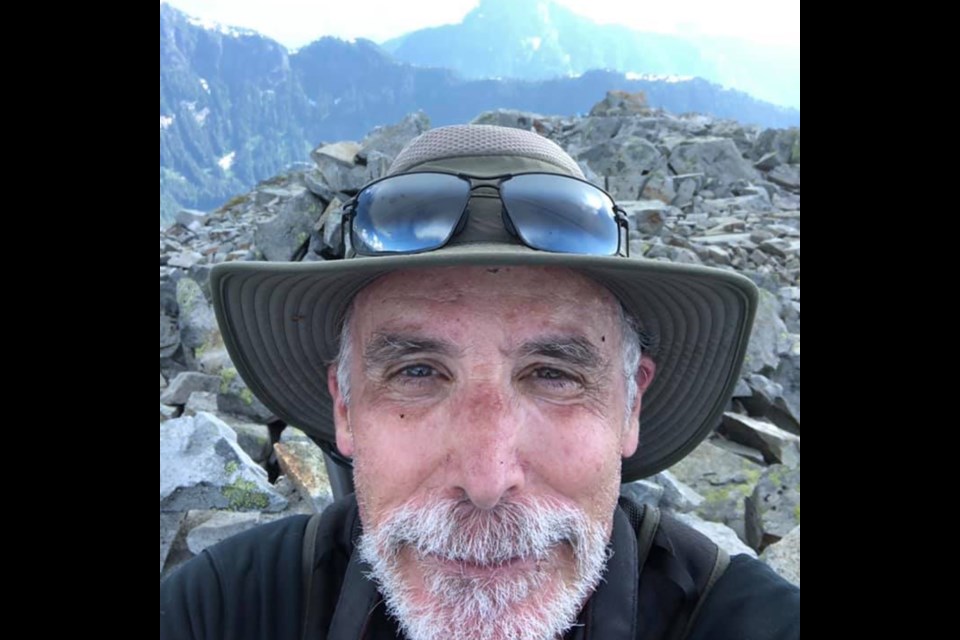Hiker Bryce Fleming wanted to take some photos of the osprey that lives out at Nanton Lake on July 20. It was an easy 45 minutes into the location, but what happened next, said Fleming, is a lesson for himself and others who hike in the great outdoors.
"I pulled up my Gaia [GPS device] on my phone and scoped out an old road that led to the south shore of Nanton Lake," said Fleming. "I could see that it was a short mile or less into the lakeshore, where I would skirt the lake until I could get a clear shot at the osprey nest from about 200 yards."
Fleming was more prepared than most, carrying a GPS device and a Garmin map; neither device requires cell phone service to work, but they do require battery power.
"The only problem was that the lake shore was a muddy mess and I found it exhausting to navigate the shoreline," said Fleming. "I looked at the Gaia map on my phone and realized that I could meet the road to my truck over land and skip the mud walking."
He said he realized he was getting into trouble because the Gaia app was quickly gobbling up his phone battery and he had no backup battery with him.
"The phone died completely about 50 yards short of finding my back trail," said Fleming. "The bush back there is abnormally dense. That old story of lost people circling aimlessly is real. I found the same boulder with the same dead tree no less than three times, having struck out in different directions each time, following a compass line."
Fleming said by 7:30 pm, after three hours of brutal bush whacking, he knew he was in terrible trouble.
"I was exhausted, dehydrated and I started to get the shakes," said Fleming. "I sat down in the forest and realized I needed help before the sun went down. I hit the SOS button on the Garmin."
On July 20, at 8:30 pm, Powell River Search and Rescue (PRSR) was tasked to locate and rescue a lost hiker near Nanton Lake.
In a message from PRSR on its Facebook page, members recounted what happened next: "The hiker had gone off trail into a swampy area. On the way back his phone ran out of battery, he got disoriented and was not able to retrace his steps. Realizing he had a couple of hours of daylight left and that he was not equipped to spend a night in the woods, he sent an SOS with his InReach."
According to PRSR, three teams were dispatched approaching the subject's last known position via old logging spurs.
"One team bushwhacked through the thick vegetation to the subject and guided him out; the subject was uninjured but tired, thirsty and getting cold," stated PRSR. "The hiker made the right decision to call for help when there was still daylight. He also didn't leave his location after sending the SOS, which immensely facilitated the rescue process."
PRSR team added that this story is a reminder to carry the 10 essentials when hiking and be prepared for the unexpected. Carry fully charged devices and a power bank; stick to trails, especially when exploring an unknown area, and consider hiking with a partner.
Grant Wood, a PRSR manager with the team, was the manager of the call on Sunday night.
"12 were in the field," Wood told the Peak. "The logging roads are opened up, and then they're deactivated, and a lot of times, those things aren't shown on the maps, so we ran into a little bit of trouble with that, but other than that, it wasn't really a difficult search."
Wood said it was just a matter of going to where the hiker was.
"Fortunately he had a GPS with him and was able to send an emergency beacon out so the crew knew exactly where he was; it was just a matter of getting to him," he added. "By all accounts, he was a reasonably prepared gentleman, and he absolutely had the right piece of equipment to be rescued."
Wood said the Garmin is a great tool to have because hikers can send messages by satellite and there is an SOS button, so the PRSR crew knew exactly where Fleming was.
Fleming said he thanks the PRSR members who were able to respond.
"Powell River Search and Rescue are the heroes of this story and, well, I am the lowly Gilligan who managed to turn an easy three hour wander along a lake shore into 10 hours of physical torment," said Fleming. "I did so many things wrong and only got a few key points right. I'll wear and take responsibility for my mistakes."
Fleming said he had never been so happy to see a bunch of uniformed people in the middle of the night.
"I'm not sure what I would have done if they had not found me," said Fleming. "My Garmin deserves credit, too, though I have a bit of a grudge against it right now."
Join the Peak’s email list for the top headlines right in your inbox Monday to Friday.




